||| FROM WALL STREET JOURNAL ||| (Reprint at request of Orcasonian reader.)
Pattie Dullea stepped out one morning last month in Napa, Calif., to have a word with the young man who pulled up in an antique sports car to tour the home across the street.
“You might not want to buy there,” she said she told the man, who was there to consider investing in the home. “We don’t want our neighborhood to turn into a timeshare neighborhood. And we are going to do everything in our power to make that not happen.”
Such scenes are becoming more common in California wine-country towns where a real estate startup called Pacaso is snapping up million-dollar homes, then selling ownership shares to second-home searchers looking for weekend getaways.
Pacaso, based in San Francisco, was co-founded by Zillow Group founder Spencer Rascoff, and it counts former Starbucks Corp. chief executive Howard Schultz among its earliest investors. The company claims to have reached unicorn status faster than any company in U.S. history, hitting a $1 billion valuation within six months of launching last year.
The Covid-19 pandemic was a boon for the business. Remote work inspired many to spend time away from cities, but rising home prices and a short supply of homes meant fewer people could afford to buy an entire second home of their own.
The opposition to Pacaso in Napa is the latest attempt by homeowners to block real-estate companies from changing how homes in their neighborhoods are occupied or owned. Homeowners and local governments have for years fought the spread of short-term rentals made through platforms like Airbnb, and high demand during the pandemic for both vacation and primary residences has only intensified the conflicts.
Austin Allison, Pacaso chief executive and a Napa resident, said the local unpleasantness was misplaced outrage about the larger shortage of affordable housing in California. The company’s 14 homes in the region, which the company markets to up to eight partial owners each, are a drop in the bucket, he said. “This housing crisis is a big problem that’s way bigger than Pacaso,” he said.
Homeowners in the Napa Valley say their quiet residential cul-de-sacs are on the brink of becoming high-traffic party zones and no longer affordable to local families. Anti-Pacaso signs dot property lines. Groups opposing its presence have organized in several towns: In Napa, there is Communities Against Timeshares (Cats); in Sonoma, Sonomans Together Opposing Pacaso (Stop) is active; and in St. Helena, Neighborhoods Opposing Pacaso Encroachment (Nope).
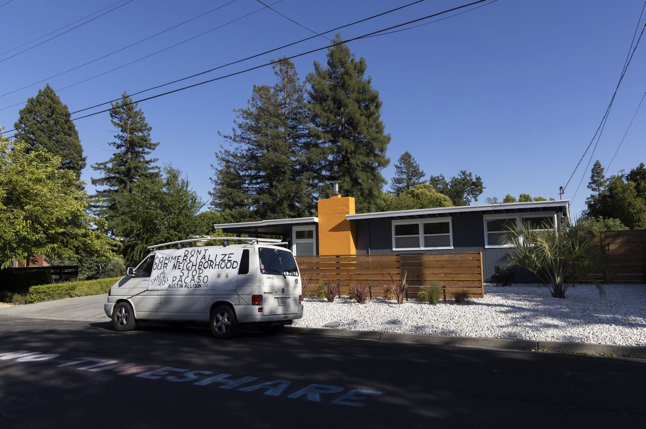
A van bearing a sign opposed to Pacaso in Napa; ‘No Timeshare’ is lettered on the pavement.
The opponents can count early victories. On Ms. Dullea’s street in Napa, Pacaso said this month it would no longer market shares in the house it bought there. The company cited community feedback in its decision to sell the house, which it will sell to a single owner. To calm concerns about reducing the stock of relatively affordable housing, the company also agreed to only buy homes priced above $2 million. And to help keep the peace, it has placed decibel limiters on stereo systems in its homes.
Napa Valley’s resistance could become a roadblock for Pacaso’s model, which relies on offering luxury-home stays inside traditional residential neighborhoods and away from typical vacation zones. The company so far has launched in 20 U.S. markets and has plans to expand to Europe.
Mr. Allison said the pushback in Napa likely would influence how the company buys homes in the future, but said it would remain committed to its core idea of acquiring homes in places like the Napa Valley, where second homes are already common. “Luxury homes in luxury neighborhoods make terrific Pacasos,” he said.
Pacaso sued the city of St. Helena, which told the business that its homes are considered illegal timeshares under a city ordinance. Pacaso says that its properties are technically not timeshares. A lawyer for St. Helena maintained the city’s position that the Pacaso timeshares violated the law.
Napa Valley has a long history of conflict between the people who live there and tourists, and some longtime residents say their towns have struggled to strike a balance. In the 1980s, locals protested the construction of the Napa Valley Wine Train, a rail project intended to ferry tourists between wineries and resort towns, though they failed to stop it.
Pacaso has accused some locals of trespassing and intimidation. One Pacaso executive filed a police report after someone responded to an online listing with the message, “I will burn down any home you buy in Napa,” according to a company spokesman. But the residents involved in protesting against Pacaso say that they don’t trespass or act aggressively.
“I think people need to just chill out and mind their own business,” said Will Maroun, a Pacaso customer in St. Helena who bought a one-eighth share in a house with backyard views of the vineyards. Mr. Maroun was hosting an outdoor dinner for four at 7 p.m. one evening when a neighbor called a noise complaint into the police, he said.
The police ordered him to turn off his music, but Mr. Maroun has continued to enjoy poolside tunes since. “They just haven’t called the cops.”
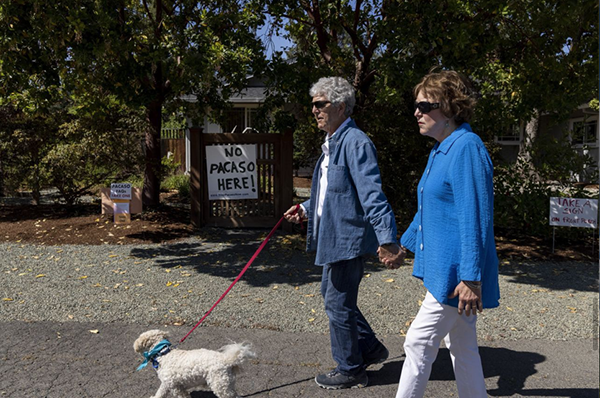
Nancy Gardner and Carl Sherrill said that when a prospective buyer arrives to tour a Pacaso house in Sonoma, Calif., neighbors make their presence known.
On Old Winery Court in Sonoma, residents of an eight-home cul-de-sac say Pacaso is the big problem. They are hoping to duplicate the victory won by Ms. Dullea and her neighbors in Napa. They are upset about the new house a former neighbor built, then sold to Pacaso this spring for $4 million. Now they worry their tightknit community will become overrun with part-timers coming and going to the house.
Every yard now has an anti-Pacaso sign, and some cars parked on the street have them, locals say. When a prospective buyer arrives to tour the property, residents alert each other and then step out of their houses, making their presence known, said Nancy Gardner and Carl Sherrill, retired homeowners opposing Pacaso.
“It’s nothing personal,” Mr. Sherrill said. “You might be the nicest people in the world. But we’re going to be angry. Because we’re angry at Pacaso.”
Mr. Allison said the pushback in Napa likely would influence how the company buys homes in the future, but said it would remain committed to its core idea of acquiring homes in places like the Napa Valley, where second homes are already common. “Luxury homes in luxury neighborhoods make terrific Pacasos,” he said.
Pacaso sued the city of St. Helena, which told the business that its homes are considered illegal timeshares under a city ordinance. Pacaso says that its properties are technically not timeshares. A lawyer for St. Helena maintained the city’s position that the Pacaso timeshares violated the law.
Napa Valley has a long history of conflict between the people who live there and tourists, and some longtime residents say their towns have struggled to strike a balance. In the 1980s, locals protested the construction of the Napa Valley Wine Train, a rail project intended to ferry tourists between wineries and resort towns, though they failed to stop it.
Pacaso has accused some locals of trespassing and intimidation. One Pacaso executive filed a police report after someone responded to an online listing with the message, “I will burn down any home you buy in Napa,” according to a company spokesman. But the residents involved in protesting against Pacaso say that they don’t trespass or act aggressively.
“I think people need to just chill out and mind their own business,” said Will Maroun, a Pacaso customer in St. Helena who bought a one-eighth share in a house with backyard views of the vineyards. Mr. Maroun was hosting an outdoor dinner for four at 7 p.m. one evening when a neighbor called a noise complaint into the police, he said.
The police ordered him to turn off his music, but Mr. Maroun has continued to enjoy poolside tunes since. “They just haven’t called the cops.”
READ FULL ARTICLE: https://www.wsj.com/articles/napa-valley-feud-pits-real-estate-startup-against-homeowners-11624181404 (Paywall)
**If you are reading theOrcasonian for free, thank your fellow islanders. If you would like to support theOrcasonian CLICK HERE to set your modestly-priced, voluntary subscription. Otherwise, no worries; we’re happy to share with you.**

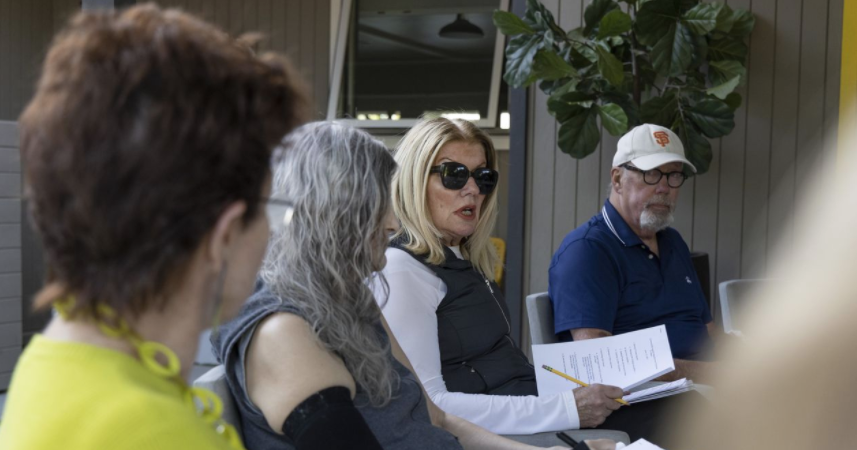


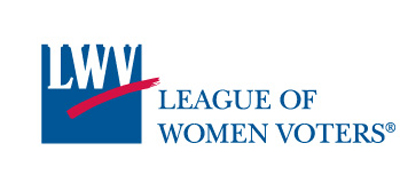
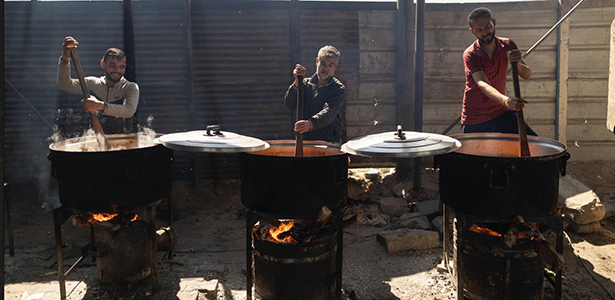



“Luxury homes in luxury neighborhoods make terrific Pacasos,” he said.
Scary.
Time to become Conservatives-abhor change or growth or progress and keep everything exactly the way it is today! You could also consider what some places do-insist that 51% of an owners time be in their home and monitor that by checking people off/on island at the ferry (yes, there are islands that do just that) and if a person falls below 51% of days they must sell the home.
Yes… my family tree goes back 171 year to Sf.. We owned a Ranch house in Saint Helena… and my grandfather built a cabin.Off the Silverado trail… It’s sad to read what a mess it has become… My third cousin worked on the wine train… and his grandfather was a US MARSHALL.. Maybe you people should look at what made Napa a special place… instead of piecing it out for money!
Neil – merely checking people in and off the ferries won’t be sufficient — who knows where those devious home owners are really sleeping. I’m pretty sure you’ll need to establish a constabulary to perform nightly bed checks. It’s likely there’s still time to get this suggestion to the Charter Review Commission so that it can be included on the ballot — the good news is that it’s far from the stupidest suggestion they’ve made.
“I think people need to just chill out and mind their own business,” said Will Maroun, a Pacaso customer in St. Helena who bought a one-eighth share in a house with backyard views of the vineyards.
Volunteers are the fabric of our islands—and other destination communities mentioned in the article. . School board members, parks board, planning commission, port commissions, service groups, senior centers, foster patents, meals on wheels and other important services that benefit the public. If we all choose to “chill out” we fail to feed our community. I hope these second home owners volunteer their time and contribute money to the service provides that sustain these destination areas.
So sad for the owners of $4 million homes in Sonoma.
Peg, you’re being cynical right (giving you the benefit of the doubt)? I mean, why be sad for the owners of the $4 million homes in Sonoma? Nobody is forcing them to make business decisions resulting in negative long-term affects upon the communities in which they’ve decided to invest their short-term rentals. I feel sorry for the members of this tight-knit community, and for members of other communities who have to go thru this experience as a result of the decisions made by some of the $4 million homeowners. I feel for those who decidedly care more about their communities than they do money, and who are negatively affected by these types of business models, and growth policies. It’s like so many things in the world today, where the people that suffer the most are the people who are the least responsible for the problems.
“The few spoil it for the many”.